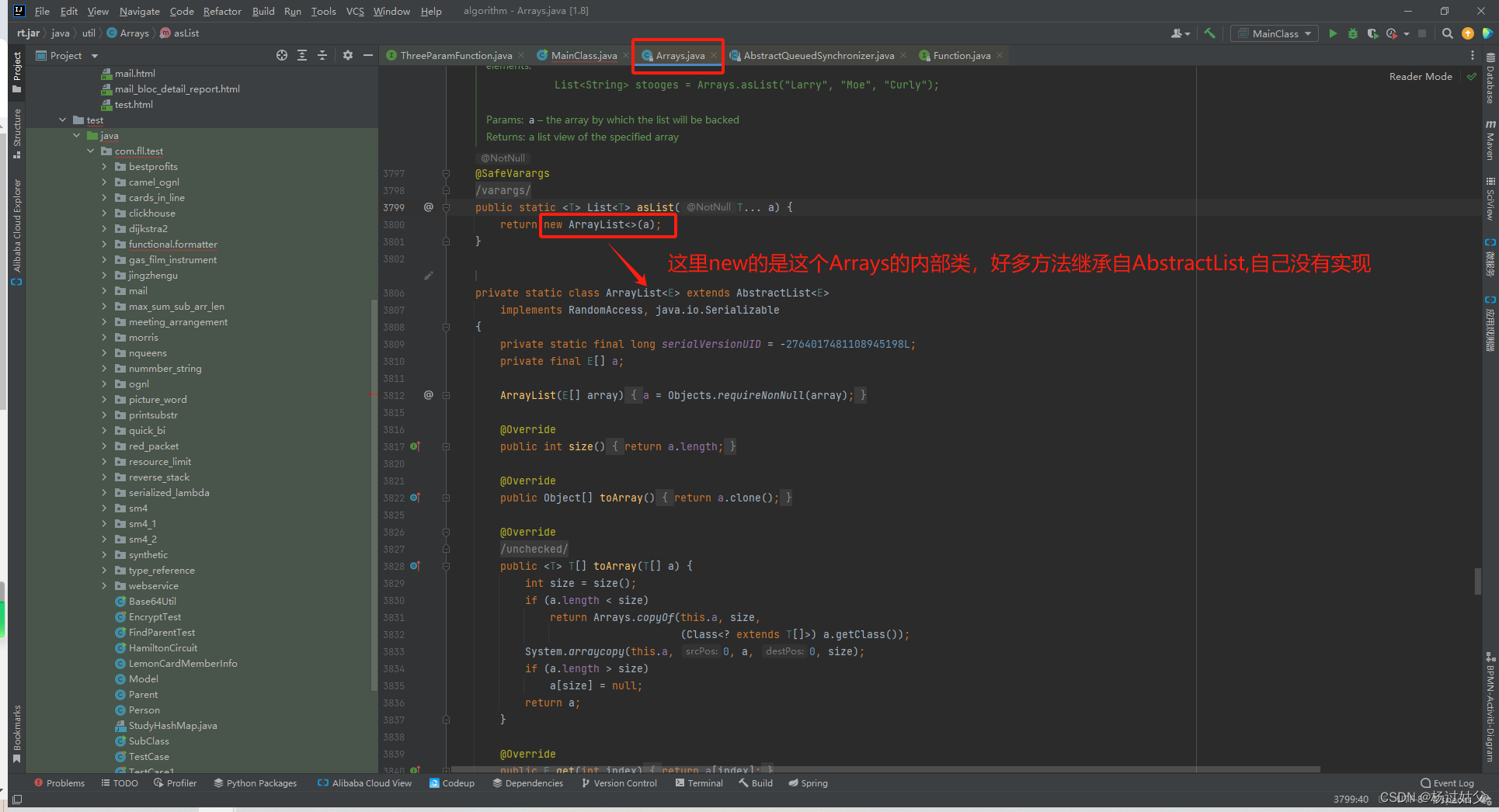在使用Arrays.asList()后调用add,remove这些method时出现java.lang.UnsupportedOperationException异常。这是由于Arrays.asList() 返回java.util.Arrays$ArrayList, 而不是ArrayList。Arrays$ArrayList和ArrayList都是继承AbstractList,remove,add等method在AbstractList中是默认throw UnsupportedOperationException而且不作任何操作。ArrayList override这些method来对list进行操作,但是Arrays$ArrayList没有override remove(),add()等,所以throw UnsupportedOperationException。

使用java.util.List.subList时最好小心点
java.util.List中有一个subList方法,用来返回一个list的一部分的视图。
List<E> subList(int fromIndex, int toIndex);它返回原来list的从[fromIndex, toIndex)之间这一部分的视图,之所以说是视图,是因为实际上,返回的list是靠原来的list支持的。
所以,你对原来的list和返回的list做的“非结构性修改”(non-structural changes),都会影响到彼此对方。
所谓的“非结构性修改”,是指不涉及到list的大小改变的修改。相反,结构性修改,指改变了list大小的修改。
那么,如果涉及到结构性修改会怎么样呢?
如果发生结构性修改的是返回的子list,那么原来的list的大小也会发生变化;
而如果发生结构性修改的是原来的list(不包括由于返回的子list导致的改变),那么返回的子list语义上将会是undefined。在AbstractList(ArrayList的父类)中,undefined的具体表现形式是抛出一个ConcurrentModificationException。
因此,如果你在调用了sublist返回了子list之后,如果修改了原list的大小,那么之前产生的子list将会失效,变得不可使用。
java List.subList方法中的超级大陷阱
在使用集合中,可能常常需要取集合中的某一部分子集来进行一下操作,于是subList这个方法就映入我们的眼帘,毫不犹豫地使用。
例如以下代码:
public static void main(final String[] args) {
List<Object> lists = new ArrayList<Object>();
lists.add("1");
lists.add("2");
lists.add("3");
lists.add("4");
List<Object> tempList = lists.subList(2, lists.size());
tempList.add("6");
System.out.println(tempList); // 1
System.out.println(lists); // 2
} 代码初步写好后,可能我们想达到的效果是:往集合lists的子集合tempList中添加一个元素6,而原有的集合保持不变。
即到达这样的效果:lists = [1, 2, 3, 4],tempList = [3, 4, 6]。但是我们看到实际的结果确是lists里边也添加了元素6。
这是怎么一会事呢,通过查找java原代码我们可以看到:tempList的subList实现代码在AbstractList类里边,然而无论如何,最终的结果都是返回一个AbstractList的子类:SubList(该类是一个使用默认修饰符修饰的类,其源代码位于AbstractList.java类文件里边),
SubList类的构造方法:
class SubList<E> extends AbstractList<E> {
private final AbstractList<E> l;
private final int offset;
private int size;
SubList(AbstractList<E> list, int fromIndex, int toIndex) {
if (fromIndex < 0)
throw new IndexOutOfBoundsException("fromIndex = " + fromIndex);
if (toIndex > list.size())
throw new IndexOutOfBoundsException("toIndex = " + toIndex);
if (fromIndex > toIndex)
throw new IllegalArgumentException("fromIndex(" + fromIndex +
") > toIndex(" + toIndex + ")");
l = list;
offset = fromIndex;
size = toIndex - fromIndex;
this.modCount = l.modCount;
}
public E set(int index, E element) {
rangeCheck(index);
checkForComodification();
return l.set(index+offset, element);
}
public E get(int index) {
rangeCheck(index);
checkForComodification();
return l.get(index+offset);
}
public int size() {
checkForComodification();
return size;
}
public void add(int index, E element) {
rangeCheckForAdd(index);
checkForComodification();
l.add(index+offset, element);
this.modCount = l.modCount;
size++;
}
public E remove(int index) {
rangeCheck(index);
checkForComodification();
E result = l.remove(index+offset);
this.modCount = l.modCount;
size--;
return result;
}
protected void removeRange(int fromIndex, int toIndex) {
checkForComodification();
l.removeRange(fromIndex+offset, toIndex+offset);
this.modCount = l.modCount;
size -= (toIndex-fromIndex);
}
public boolean addAll(Collection<? extends E> c) {
return addAll(size, c);
}
public boolean addAll(int index, Collection<? extends E> c) {
rangeCheckForAdd(index);
int cSize = c.size();
if (cSize==0)
return false;
checkForComodification();
l.addAll(offset+index, c);
this.modCount = l.modCount;
size += cSize;
return true;
}
public Iterator<E> iterator() {
return listIterator();
}
public ListIterator<E> listIterator(final int index) {
checkForComodification();
rangeCheckForAdd(index);
return new ListIterator<E>() {
private final ListIterator<E> i = l.listIterator(index+offset);
public boolean hasNext() {
return nextIndex() < size;
}
public E next() {
if (hasNext())
return i.next();
else
throw new NoSuchElementException();
}
public boolean hasPrevious() {
return previousIndex() >= 0;
}
public E previous() {
if (hasPrevious())
return i.previous();
else
throw new NoSuchElementException();
}
public int nextIndex() {
return i.nextIndex() - offset;
}
public int previousIndex() {
return i.previousIndex() - offset;
}
public void remove() {
i.remove();
SubList.this.modCount = l.modCount;
size--;
}
public void set(E e) {
i.set(e);
}
public void add(E e) {
i.add(e);
SubList.this.modCount = l.modCount;
size++;
}
};
}
public List<E> subList(int fromIndex, int toIndex) {
return new SubList<>(this, fromIndex, toIndex);
}
private void rangeCheck(int index) {
if (index < 0 || index >= size)
throw new IndexOutOfBoundsException(outOfBoundsMsg(index));
}
private void rangeCheckForAdd(int index) {
if (index < 0 || index > size)
throw new IndexOutOfBoundsException(outOfBoundsMsg(index));
}
private String outOfBoundsMsg(int index) {
return "Index: "+index+", Size: "+size;
}
private void checkForComodification() {
if (this.modCount != l.modCount)
throw new ConcurrentModificationException();
}
}里边,将我们原有的list对象给缓存到SubList类对象的一个属性中去了。
而SubList类的add/remove等修改元素的方法中,都使用 l 进行了操作:
因此,当我们使用子集合tempList进行元素的修改操作时,会影响原有的list集合。所以在使用subList方法时,一定要想清楚,是否需要对子集合进行修改元素而不影响原有的list集合。
如果需要对子集合的元素进行修改操作而不需要影响原集合时,我们可以使用以下方法进行处理:




















 3746
3746











 被折叠的 条评论
为什么被折叠?
被折叠的 条评论
为什么被折叠?








